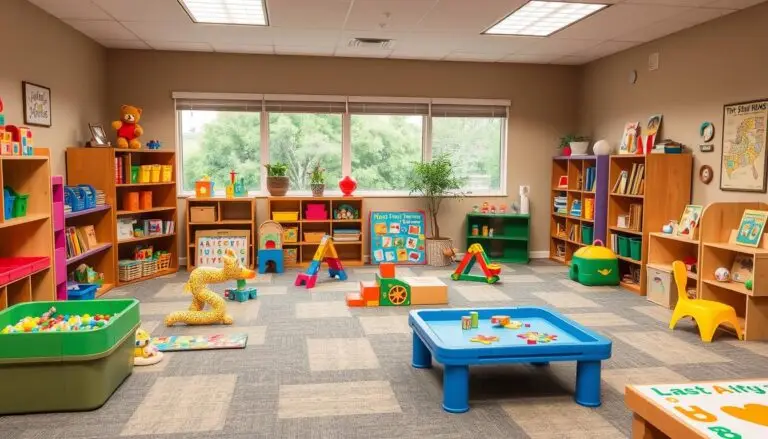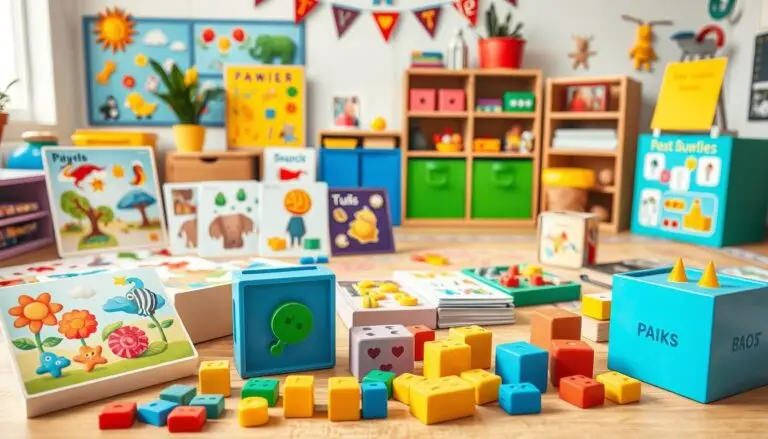Sensory toys for children with autism are in demand
Sensory toys for children with autism are in demand, and you can focus on how to make these at home
In recent years, there’s been a big need for sensory toys for kids with autism. These toys help these children with their senses, which is key for their growth and happiness. As a parent or caregiver, making DIY sensory toys at home can really help your child.
Sensory toys are crucial for kids with autism. They help manage their senses, improve focus, and encourage learning and social skills. Making these toys yourself can save money and make them just right for your child. In this article, we’ll show you how to make fun and affordable homemade sensory toys.

Key Takeaways
- Sensory toys for children with autism are in high demand as they address their unique sensory processing needs.
- Creating DIY sensory toys at home can be a cost-effective and personalized approach to supporting your child’s development.
- Homemade sensory toys can help regulate the senses, improve focus, and promote learning and social engagement.
- Crafting sensory toys allows you to tailor them to your child’s specific preferences and requirements.
- Engaging in the process of making sensory toys can be a fun and bonding experience for both you and your child.
The Importance of Sensory Play for Children with Autism
Sensory play is key for kids with autism. It’s not just fun; it’s vital for their growth. Understanding their unique sensory needs is the first step in helping them.
Understanding Sensory Processing Differences
Children with autism might have trouble with sensory inputs. They might be too sensitive to touch, sound, or light. Or they might seek out intense sensory experiences. These differences can cause behavioral issues and make everyday tasks hard.
Benefits of Sensory Toys for Development
- Improved self-regulation: Sensory toys help kids with autism manage their feelings and actions.
- Enhanced fine and gross motor skills: Playing with sensory toys boosts muscle coordination.
- Increased focus and attention: Sensory play can keep a child’s attention, helping them focus.
- Reduced anxiety and stress: Sensory toys can calm kids, reducing anxiety and stress.
- Cognitive and language development: Sensory play can improve thinking and language skills.
Using sensory toys for autism helps support sensory processing in autism. It aids in autism sensory development. Sensory integration therapy and sensory toys are great for helping kids with autism reach their goals.

DIY Sensory Toys for Kids with Autism
Making sensory toys at home is rewarding and saves money. It’s a great way to meet the special needs of kids with autism. You can find many DIY ideas here, from easy to more complex projects.
Creating a “busy board” is a fun and simple project. It’s filled with textures and elements for kids to explore. Use materials like zippers, buttons, and fabrics on a wooden board or cardboard. It helps improve fine motor skills and awareness.
Another affordable idea is a weighted lap pad or snake. Fill a pillowcase or pouch with rice or beads for deep pressure. This can calm kids with autism. These homemade toys are customizable and useful for kids.
FAQ
What are the benefits of sensory toys for children with autism?
Sensory toys help kids with autism in many ways. They improve how kids process their senses and help them feel calm. These toys also boost fine motor skills and encourage kids to interact and talk more.
How can I make affordable DIY sensory toys at home?
Creating DIY sensory toys at home is easy and cheap. You can use things like cardboard, yarn, rice, and Play-Doh. This way, you can make toys that fit your child’s needs and interests.
What types of sensory toys are best for children with autism?
For kids with autism, some top toys include fidget toys, weighted blankets, and textured balls. Light-up toys and soothing sounds are also great. The goal is to find toys that help your child feel calm and focused.
How can I incorporate sensory play into my child’s daily routine?
Adding sensory play to your child’s day can be very helpful. Try doing it during playtime, when they need to calm down, or during transitions. You can also make a special sensory corner or add sensory activities to daily tasks.
Where can I find resources and support for creating sensory toys for my child with autism?
There are lots of online resources for making sensory toys. You can find videos, blog posts, and social media groups that show you how. Occupational therapists and autism support groups can also give you advice and suggestions.






